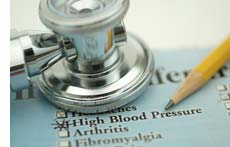Low Vitamin D Levels May Increase Heart Disease Risk

At a Glance:
A study published in the journal Circulation showed that low levels of vitamin D may increase the risk of cardiovascular events, including heart attack, heart failure, or stroke. Individuals with both hypertension and low vitamin D levels had nearly double the risk of cardiovascular problems.
Read more about this research below. Interest in vitamin D has been increasing in recent months with a growing number of studies linking the vitamin to protection against osteoporosis and certain cancers. There is also evidence that a higher intake of vitamin D may be helpful with regard to high blood pressure, fibromyalgia, diabetes mellitus, multiple sclerosis, and rheumatoid arthritis.
In a population-based study, researchers used data from 1739 participants in the Framingham Offspring Study to study the relationship between vitamin D levels and cardiovascular health risk. Although vitamin D levels above 30 ng/mL are considered optimal for bone metabolism, only 10 percent of the participants had levels in this range. In fact, 28 percent had blood levels lower than 15 ng/mL. Participants with levels below 15 ng/mL had a 62 percent greater chance to develop cardiovascular events than those with higher levels. People with low vitamin D levels and high blood pressure (> 140/90 mmHg), were found to have double the risk of cardiovascular problems compared to people with normal blood pressure and vitamin D levels.
Vitamin D is produced in the skin on exposure to UVB radiation (sunlight) and obtained in the diet from foods like oily fish, egg yolk, and liver. Recent studies have shown, however, that sunshine levels in some northern countries are so weak during the winter months that the human body makes little to no vitamin D, leading to widespread deficiencies. In addition, increased skin pigmentation also reduces the effect of UVB radiation, meaning darker skinned people are at greater risk.
The results from this study raise the possibility that treating vitamin D deficiency, by supplementation and/or lifestyle measures, could reduce the risk of cardiovascular events.
Wang TJ, et al. Vitamin D Deficiency and Risk of Cardiovascular Disease. 2008. Circulation 117(4):503-11.







No comments:
Post a Comment